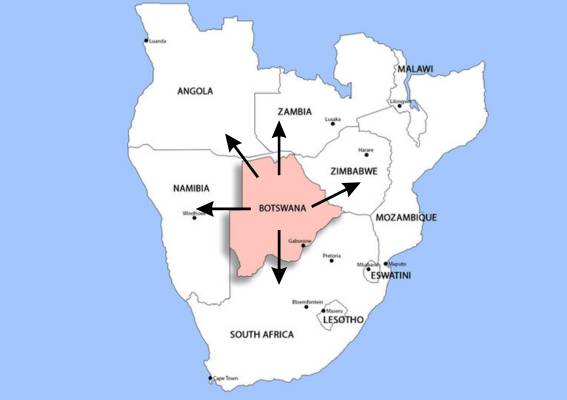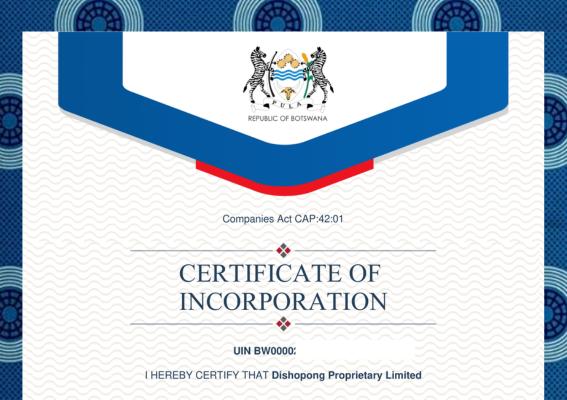Table of Contents
ToggleDumela and welcome! If you’re dreaming of starting your own business in Botswana, you’ve landed in just the right spot. This blog is specially designed for you, no matter where you are in the world.
We’re excited to present our guide, ‘How to Start a Business in Botswana: A Step-by-Step Guide.‘ It’s a friendly and straightforward roadmap to help you set up your business in Botswana, filled with useful tips and insights. Whether you’re new to the business world or have some experience under your belt, you’ll find something valuable here.
Ready to make your business dream a reality in Botswana? Great! We’re thrilled to be part of your journey and can’t wait to help you succeed. Let’s get started and explore the wonderful opportunities that await you in Botswana!
Why Start a Business in Botswana?
Thinking about Botswana for your business venture? There’s more to this beautiful country than just its stunning landscapes and rich culture. Let’s dive into why Botswana is an excellent choice for entrepreneurs.
Stable and Growing Economy
Botswana stands out with its robust economy, one of the most stable in Africa. Imagine your business as a steady ship navigating smoothly through the unpredictable waves of the global economy. That’s the kind of stability Botswana offers, providing a secure foundation for your business dreams.
A Welcoming Business Environment
Beyond its economic stability, Botswana’s government is genuinely committed to supporting businesses. With initiatives aimed at nurturing entrepreneurship and policies that make doing business easier, Botswana is an ideal place for starting or expanding your venture. The collaboration between the government and the community here creates a nurturing environment for businesses to flourish.
Strategically Positioned for Growth
Botswana’s location is strategic too. Positioned at the heart of Southern Africa and bordering countries like Zimbabwe and South Africa, it serves as a gateway to a vast market. As part of the Southern African Development Community (SADC), your business can tap into a market of millions across diverse demographics. This strategic position offers a competitive advantage that’s hard to overlook. Curious about the SADC and its impact in the region? Discover more on their official website.

Considering all these factors, launching a business in Botswana is more than just a smart choice; it’s an opportunity to tap into a region brimming with potential. But that’s just the beginning. Let’s explore further and uncover the full spectrum of opportunities awaiting you in Botswana’s dynamic business landscape.
Understanding the Business Climate in Botswana
Diving into Botswana’s business climate reveals a world brimming with opportunities and a thriving entrepreneurial spirit. To navigate this landscape successfully, it’s essential to grasp its nuances. Here’s a snapshot of what makes Botswana’s business environment so inviting:
Diverse and Dynamic Industries
Botswana’s economy isn’t just about diamonds; it’s a mosaic of sectors waiting for exploration. From the bustling tourism and mining industries to the emerging fields of technology and financial services, there’s a sector for every entrepreneurial passion and expertise.
Entrepreneur-Friendly Government Policies
The Botswana Investment and Trade Centre (BITC) plays a pivotal role in shaping a business-friendly environment. With policies that encourage investment and support local entrepreneurship, Botswana is laying a fertile ground for business growth and innovation.
A Skilled and Educated Workforce
At the heart of Botswana’s economic progress is its commitment to education and skills development. This focus has cultivated a workforce that’s not only skilled but also ready to propel businesses to new heights.
Robust Infrastructure
Investment in infrastructure is a cornerstone of Botswana’s business environment. With its modern transport networks, dependable energy sources, and advanced communication systems, the country sets the stage for businesses to operate smoothly and expand efficiently.
Global Trade Connections
Botswana’s strategic international alliances, including membership in the SADC and access to markets through the African Continental Free Trade Area (AfCFTA), offer businesses a gateway to the global marketplace.
Insight into Consumer Behavior
Understanding the local consumer market is crucial. Botswana’s growing middle class, with its increasing purchasing power, presents a unique opportunity for businesses that can align their offerings with the local consumer needs and preferences.

Grasping the intricacies of Botswana’s business climate is a vital step in unlocking the potential that awaits you. With this knowledge in hand, you’re well-prepared to start your entrepreneurial journey in Botswana with confidence. Now, let’s delve into the step-by-step process of launching your business in this dynamic market!
Step 1: Crafting Your Business Idea in Botswana
Finding Your Niche
Every successful business starts with a solid idea. In Botswana, the key is to identify a niche that not only aligns with your passions and skills but also meets a specific market need. Consider the vibrant industries you’ve learned about – is there a gap you can fill? Maybe there’s a way to innovate in the tourism sector, or perhaps there’s a growing demand in the tech industry that matches your expertise.
Research and Inspiration
Don’t hesitate to dive into research. Look at what successful businesses in Botswana and similar economies are doing. Attend local business events, network with other entrepreneurs, and keep an eye on global trends that could influence the local market. Inspiration can come from anywhere – it might be a conversation, an article, or even observing everyday life in Botswana.
For in-depth market insights and trends, consider using tools like Statista, which offers comprehensive market data that can help you understand consumer behavior and industry trends in Botswana and globally.
Validating Your Idea
Once you have a concept, validate it. Talk to potential customers, get feedback, and assess the competition. This step is crucial to ensure there’s a real demand for your product or service. You can also conduct surveys or use online tools to gauge interest.
Sustainability and Scalability
Consider the long-term viability of your idea. Is it sustainable, and can it scale? Botswana’s commitment to sustainable development and its growing economy offer a fertile ground for ideas that consider environmental and social impacts.
Resources and Support
Remember, you’re not alone in this journey. Botswana offers various resources for entrepreneurs, including mentorship programs, business development services, and funding opportunities. Engage with organizations like the Botswana Investment and Trade Centre (BITC) for guidance and support.
Additionally, exploring platforms like Entrepreneurship.org, a resource hub for entrepreneurs, can provide you with valuable insights and guidance on starting and growing your business.

Next Steps
Now that you have a solid business idea, what’s next? Stay tuned for the upcoming section where we’ll delve into conducting effective market research in Botswana – a critical step to ensure your business idea has the potential to thrive.
Step 2: Conducting Market Research in Botswana
Understanding Your Market
Before diving into the business world of Botswana, it’s crucial to understand the market you’re entering. Market research is the backbone of any successful business plan. It helps you grasp the needs and preferences of your target customers, assess competition, and identify potential challenges and opportunities.
Methods of Market Research
- Surveys and Questionnaires: Reach out to potential customers through online surveys or questionnaires. Tools like SurveyMonkey or Google Forms can be invaluable for gathering data.
- Interviews and Focus Groups: Conduct interviews with individuals or focus groups to gain deeper insights into consumer behavior and preferences.
- Competitor Analysis: Analyze your competitors. Understand their strengths, weaknesses, and strategies. Tools like SEMrush can provide competitive intelligence.
- Market Trends Analysis: Stay updated with the latest market trends. Websites like MarketWatch or Business Botswana can offer valuable information about the economic environment in Botswana.
Utilizing Local Resources
Botswana offers various local resources for market research. Engage with local business development services, chambers of commerce, and industry associations. They can provide valuable insights and data specific to the Botswana market.
Online and Offline Research
Combine both online and offline research methods. While online tools and resources are invaluable, don’t underestimate the power of on-the-ground research in local Botswana markets.
Adapting to Cultural Nuances
Understanding the cultural nuances of Botswana is vital. It affects consumer behavior and preferences. Ensure your research methods are culturally sensitive and appropriate.

Moving Forward
With a thorough understanding of the Botswana market, you’re now better equipped to refine your business idea and strategy. Up next, we’ll delve into crafting a solid business plan – a roadmap for your entrepreneurial journey in Botswana.
Step 3: Crafting a Solid Business Plan for Your Botswana Venture
The Blueprint of Success
A well-thought-out business plan is your roadmap to success. It’s not just a document for investors; it’s a strategic tool for you to outline your business goals, strategies, and the steps you’ll take to achieve them.
Key Components of a Business Plan
- Executive Summary: This is an overview of your business concept, goals, and unique selling points. It should be compelling enough to grab the reader’s attention.
- Business Description: Detail what your business does, the industry it operates in, and its business model.
- Market Analysis: Incorporate your findings from the market research. Show an understanding of your target market, customer needs, and competition.
- Organization and Management: Outline your business structure, leadership team, and staffing plans.
- Products or Services: Describe what you’re selling or the services you’re offering, emphasizing how they meet market needs.
- Marketing and Sales Strategy: Explain how you plan to attract and retain customers.
- Financial Projections: Include detailed forecasts of income, cash flow, and expenditure. This section is crucial if you’re seeking funding.
- Funding Request (if applicable): If you’re seeking external funding, specify the amount needed and how it will be used.
Tailoring to the Botswana Context
While creating your business plan, tailor it to the Botswana market. Highlight how your business aligns with local trends, consumer behavior, and regulatory environments.
Resources for Assistance
Consider seeking help from local business advisors or consultants. Organizations like Business Botswana offer support and resources that can guide you in creating a robust business plan.
Review and Revise
Remember, your business plan is a living document. As your business grows and the market evolves, revisit and update your plan accordingly.
Kickstart your venture with our Business Plan Basics: Botswana Template & Guide. Tailored for Botswana’s market, this guide provides a step-by-step template and local insights to ensure your business plan is a blueprint for success. Explore now and begin your journey to business excellence.

Looking Ahead
With your business plan in hand, you’re one step closer to making your business a reality in Botswana. Next, we’ll explore choosing the right legal structure for your business – a critical decision in your entrepreneurial journey.
Step 4: Choosing the Right Legal Structure for Your Business in Botswana
The Foundation of Your Business
Selecting the appropriate legal structure is crucial as it affects everything from your tax obligations to your personal liability and the ability to raise capital. Botswana offers several options, each with its own advantages and considerations.
Common Business Structures in Botswana
- Sole Proprietorship: Ideal for small, low-risk businesses. This structure is simple to set up and offers complete control, but it also means personal liability for business debts.
- Partnership: Suitable for businesses owned by two or more people. It shares many characteristics of sole proprietorships but with shared responsibility.
- Private Limited Company (Pty Ltd): This is a popular choice for small to medium-sized businesses. It offers limited liability protection, meaning personal assets are protected from business debts.
- Public Limited Company (PLC): Suitable for larger businesses. PLCs can raise capital by selling shares to the public but come with increased regulatory requirements.
- Non-Profit Organization: For businesses that operate for charitable, educational, or community purposes without the intention of making a profit.
Considerations for Your Choice
- Liability: How much personal risk are you willing to take?
- Taxation: Different structures have different tax implications.
- Capital Needs: How do you plan to fund your business?
- Control: Do you want to retain full control, or are you willing to share decision-making?
- Compliance and Paperwork: Some structures require more ongoing paperwork and compliance than others.
Getting Professional Advice
It’s advisable to consult with a legal or business advisor in Botswana to understand the best fit for your business. Organizations like the Companies and Intellectual Property Authority (CIPA) in Botswana can also provide guidance.
Registration Process
Once you’ve chosen your structure, the next step is to register your business. The process varies depending on the structure, but it typically involves registering with CIPA and obtaining the necessary licenses and permits.

What’s Next?
With your legal structure in place, you’re laying a strong foundation for your business in Botswana. Up next, we’ll guide you through the process of registering your business – a key step in making your entrepreneurial dream a reality.
Step 5: Registering Your Business in Botswana
Navigating the Registration Process
Registering your business is a critical step in making it official and legal. In Botswana, this process involves several key steps and requirements, which vary depending on your chosen legal structure.
Key Steps in Business Registration
- Name Reservation: Start by reserving your business name through the Companies and Intellectual Property Authority (CIPA). This ensures that your chosen name is unique and not already in use.
- Documentation Preparation: Prepare and submit the necessary documents. This typically includes forms detailing your business structure, ownership, and directors (for companies), and your business plan.
- Registration with CIPA: Submit your application for business registration to CIPA. This can be done online or at their offices. For a more detailed step-by-step guide on navigating CIPA’s registration process, check out our comprehensive guide: “How to Register a Company/Business in Botswana: Quick Guide“.
- Tax Registration: Register your business with the Botswana Unified Revenue Service (BURS) for tax purposes. This is crucial for legal compliance.
- Obtaining Necessary Licenses and Permits: Depending on your business type, you may need specific licenses or permits. Check with local authorities to ensure you have all the necessary approvals.
Tips for a Smooth Registration Process
- Gather All Required Information: Before starting the process, ensure you have all the necessary information and documents.
- Seek Professional Help: Consider hiring a local business consultant or legal advisor to help navigate the registration process.
- Understand the Costs: Be aware of the fees associated with registration and licensing.
After Registration
Once your business is registered, you’ll receive a certificate of incorporation (for companies) or a business registration certificate. Keep these documents safe as they’re often required for banking and other official purposes.

What’s Next?
With your business officially registered, you’re ready to move on to the next phase of your entrepreneurial journey in Botswana. Up next, we’ll discuss financing options for your new business – an essential aspect of getting your venture off the ground.
Step 6: Financing Your Business in Botswana
Exploring Your Funding Options
Securing funding is a critical step in getting your business off the ground. In Botswana, there are several avenues you can explore to finance your business, each with its own advantages and requirements.
Types of Business Financing
- Personal Savings: Often the first port of call, using your own funds can be the simplest form of financing, though it may not be sufficient for all your needs.
- Bank Loans: Banks in Botswana offer various loan products for businesses. Be prepared to present a solid business plan and financial projections.
- Investors: You can seek investment from venture capitalists or angel investors. This often requires giving up a portion of your business equity.
- Government Grants and Subsidies: The Botswana government offers various grants and subsidies to support businesses, particularly in certain sectors or for innovative projects.
- Crowdfunding: Platforms like Kickstarter or GoFundMe can be used to raise funds, especially for unique or community-focused projects.
Tips for Securing Funding
- Have a Clear Plan: Whether you’re applying for a loan or pitching to investors, a clear and detailed business plan is essential.
- Understand the Terms: Be clear about the terms of any funding you accept, including interest rates, equity stakes, and repayment schedules.
- Build a Strong Pitch: If seeking investors, your pitch should be compelling, highlighting the potential of your business and your capability as an entrepreneur.
- Explore Local Opportunities: Look into local funding options specific to Botswana, as they may offer more favorable terms for local businesses.
Additional Resources
The Botswana Investment and Trade Centre (BITC) and local financial advisors can provide guidance on funding options and how to apply for them.

What’s Next?
With your business officially registered, you’re ready to move on to the next phase of your entrepreneurial journey in Botswana. Up next, we’ll discuss financing options for your new business – an essential aspect of getting your venture off the ground.
Step 7: Setting Up Your Business Operations in Botswana
Laying the Groundwork for Success
With your business legally registered and financed, the next crucial step is to set up your operational base. This involves several key components that will form the backbone of your daily business activities.
Key Components of Business Operations
- Choosing a Location: Select a location that aligns with your business needs. Consider factors like target market proximity, accessibility, and rental costs. For retail businesses, foot traffic is crucial, while office-based businesses might prioritize connectivity and infrastructure.
- Setting Up Your Office or Store: Whether it’s a physical store or an office, ensure your space is equipped with the necessary tools and technology. This includes computers, internet connectivity, and other essential office supplies or equipment.
- Hiring Staff: If your business requires additional personnel, start the hiring process. Focus on finding individuals who not only have the necessary skills but also fit your company culture.
- Establishing Supply Chains: For businesses that require inventory, establish reliable supply chains. Build relationships with suppliers and understand delivery timelines and costs.
- Implementing Systems and Processes: Develop and implement key business processes and systems. This includes accounting systems, customer relationship management (CRM) software, and inventory management systems.
Leveraging Technology
Embrace technology to streamline operations. This can range from simple solutions like cloud storage for documents to more complex systems like e-commerce platforms or digital marketing tools.
Compliance and Best Practices
Ensure compliance with local laws and regulations. This includes labor laws, health and safety standards, and industry-specific regulations. Staying compliant not only avoids legal issues but also builds credibility with customers and partners.
Networking and Community Engagement
Engage with the local business community in Botswana. Networking can open doors to new opportunities, partnerships, and valuable insights into the local market.

What’s Next?
With your business operations in place, you’re ready to bring your products or services to the market. In the next section, we’ll dive into marketing strategies to help you reach your target audience and grow your business in Botswana.
Step 8: Marketing Your Business in Botswana
Crafting a Winning Marketing Strategy
With your business up and running, it’s time to attract customers and grow your market share. A well-thought-out marketing strategy is key to achieving this. In Botswana’s diverse market, understanding local preferences and leveraging the right channels can make a significant difference.
Understanding Your Audience
- Market Research: Revisit your initial market research to understand your target audience’s preferences and behaviors.
- Local Insights: Consider cultural nuances and local trends in Botswana that might influence your marketing strategies.
Marketing Channels
- Digital Marketing: Utilize online platforms like social media, email marketing, and your business website. Consider using local online marketplaces and forums to reach a wider audience.
- Traditional Advertising: Depending on your target market, traditional methods like radio, television, and print media can be effective.
- Community Engagement: Participate in local events, sponsor community activities, or collaborate with local influencers to build brand awareness.
- Word of Mouth: Encourage satisfied customers to refer others. In many communities in Botswana, word of mouth is a powerful marketing tool.
Branding and Positioning
Develop a strong brand that resonates with your target audience. Your branding should reflect what your business stands for and differentiate you from competitors.
Measuring Success
Set clear goals for your marketing efforts and use tools to track and measure success. Adjust your strategies based on what works best in the Botswana market.
Leveraging Local Resources
Consider resources like the Botswana Trade and Investment Centre (BITC) for insights and support in marketing your business effectively in Botswana.

Looking Ahead
Effective marketing can elevate your business, creating lasting customer relationships and driving growth. As you implement these strategies, keep an eye on market trends and be ready to adapt. In the next section, we’ll wrap up with key takeaways and final thoughts on starting your business journey in Botswana.
Conclusion: Embarking on Your Business Journey in Botswana
Summing Up Your Path to Success
We’ve journeyed through the essential steps of starting a business in Botswana, from understanding the vibrant business climate to crafting a business plan, choosing the right legal structure, registering your business, securing financing, setting up operations, and implementing effective marketing strategies. Each step is a building block towards establishing a successful business in Botswana’s dynamic and promising market.
Take the Next Step with Lephutshi
As you embark on this exciting entrepreneurial journey, remember that resources and support are available to help you succeed. For businesses looking to gain visibility and connect with a broader audience, Lephutshi: Botswana Business Directory & Advertiser is an invaluable tool.
- List Your Business: Increase your business’s exposure by listing it on Lephutshi. It’s a platform designed to help local businesses thrive by connecting them with potential customers.
- Web Design and Digital Marketing Solutions: If you’re in need of professional web design and digital marketing solutions, look no further than Lephutshi Developers, Botswana’s specialists in creating a robust online presence for your business.
Your Partner in Growth
Whether you’re just starting out or looking to expand your business, Lephutshi is here to support you every step of the way. With our comprehensive directory services and expert digital solutions, we’re committed to helping your business flourish in Botswana’s vibrant economy.
Ready to Start?
Your business journey in Botswana is full of potential. With the right approach, resources, and determination, you can turn your entrepreneurial dreams into reality. Start today by taking the first step towards building your business legacy in Botswana.
FAQ Section: Starting a Business in Botswana
The first steps include conducting market research, crafting a business plan, choosing the right legal structure, and registering your business with the Companies and Intellectual Property Authority (CIPA) in Botswana.
Both residents and non-residents can register a business in Botswana. However, the process and requirements may vary depending on the individual’s residency status.
The common business structures in Botswana include Sole Proprietorship, Partnership, Private Limited Company (Pty Ltd), Public Limited Company (PLC), and Non-Profit Organization.
Business financing options in Botswana include personal savings, bank loans, investors, government grants and subsidies, and crowdfunding platforms.
Key considerations include understanding your target audience, choosing the right marketing channels (digital and traditional), community engagement, and measuring the success of your marketing efforts.
Requirements include having a unique business name, preparing necessary documentation, registering with CIPA, tax registration with the Botswana Unified Revenue Service (BURS), and obtaining necessary licenses and permits.
Understanding local market trends is crucial for tailoring your products or services to meet the needs and preferences of the local consumer base, and for adapting to cultural nuances and local business practices.





